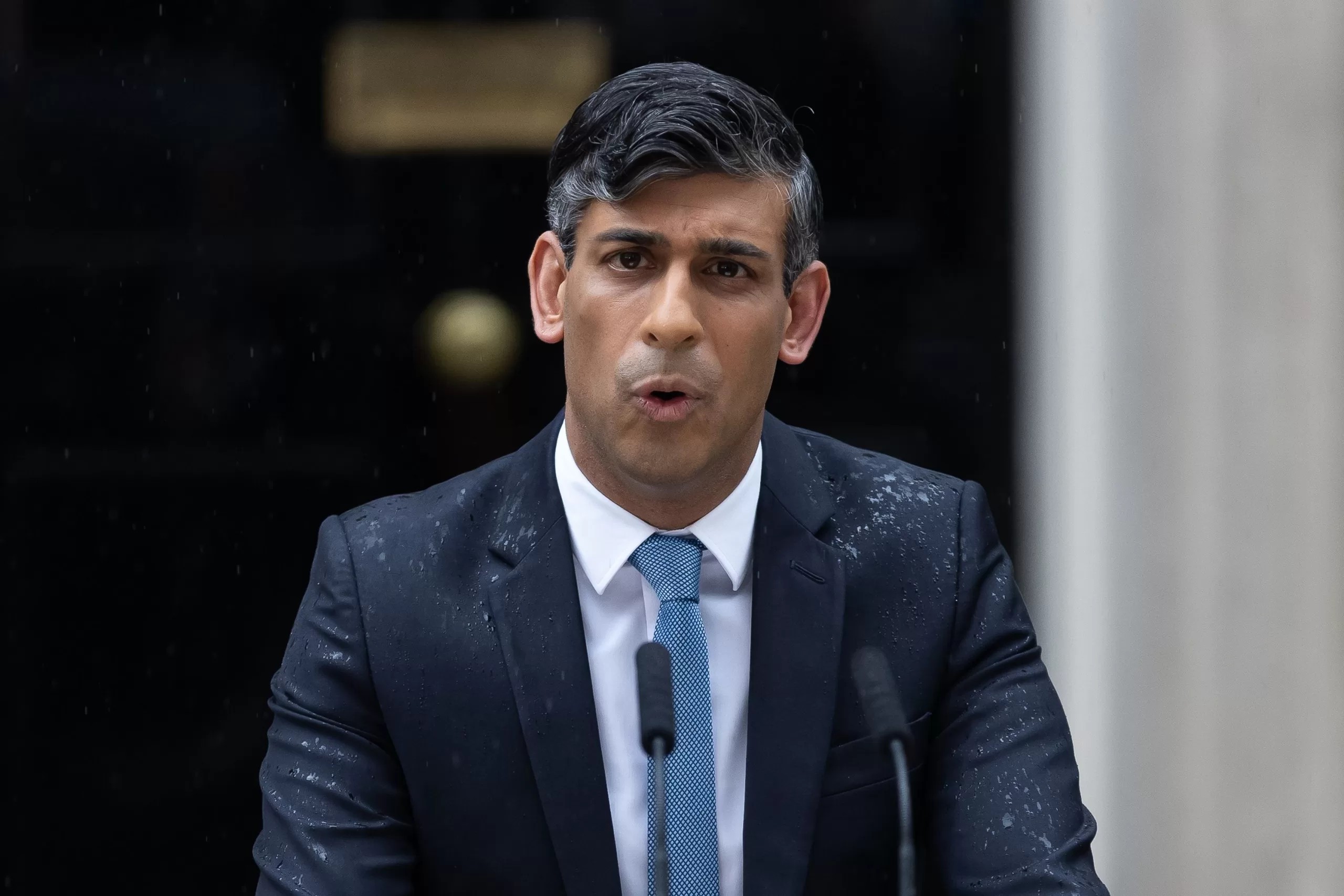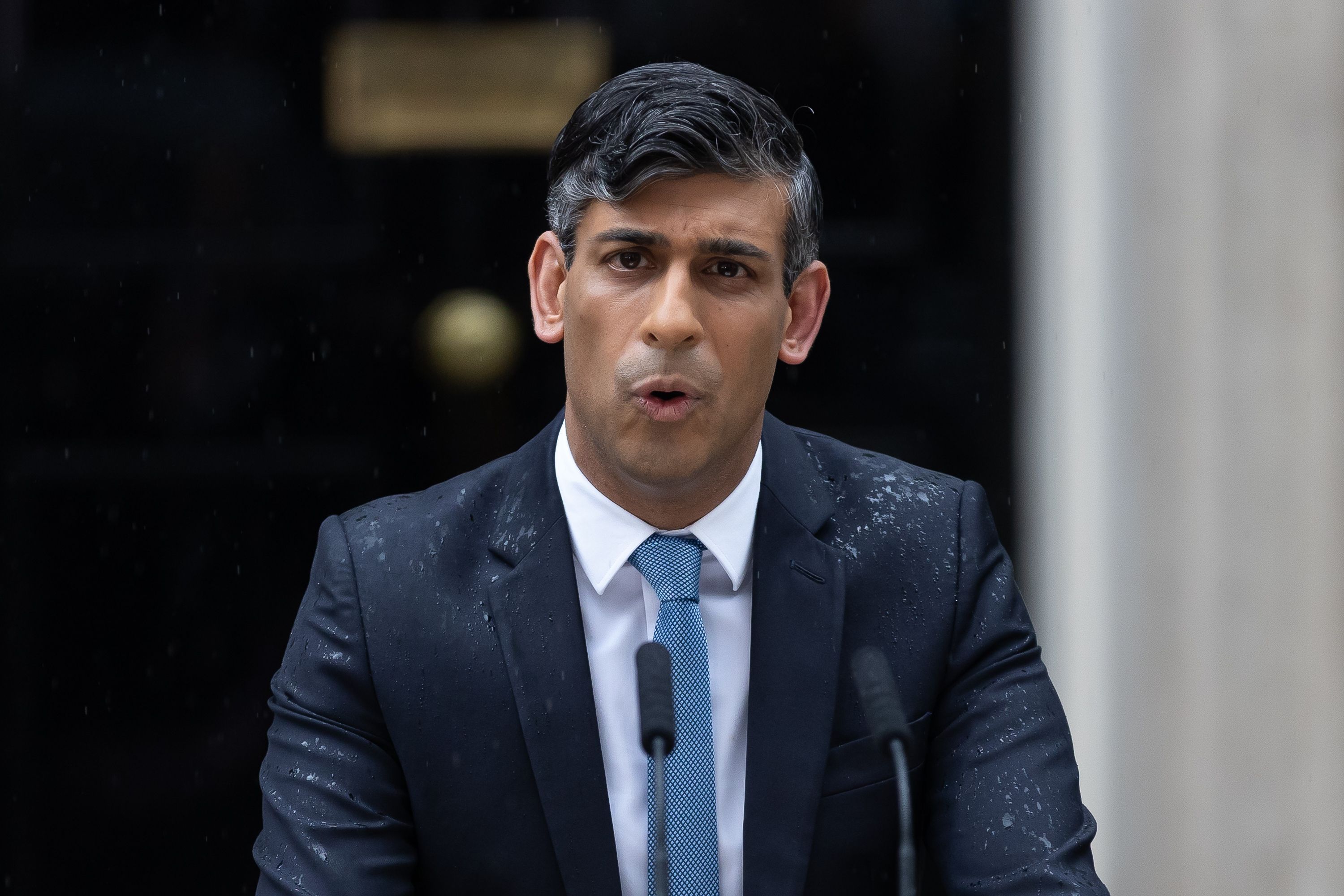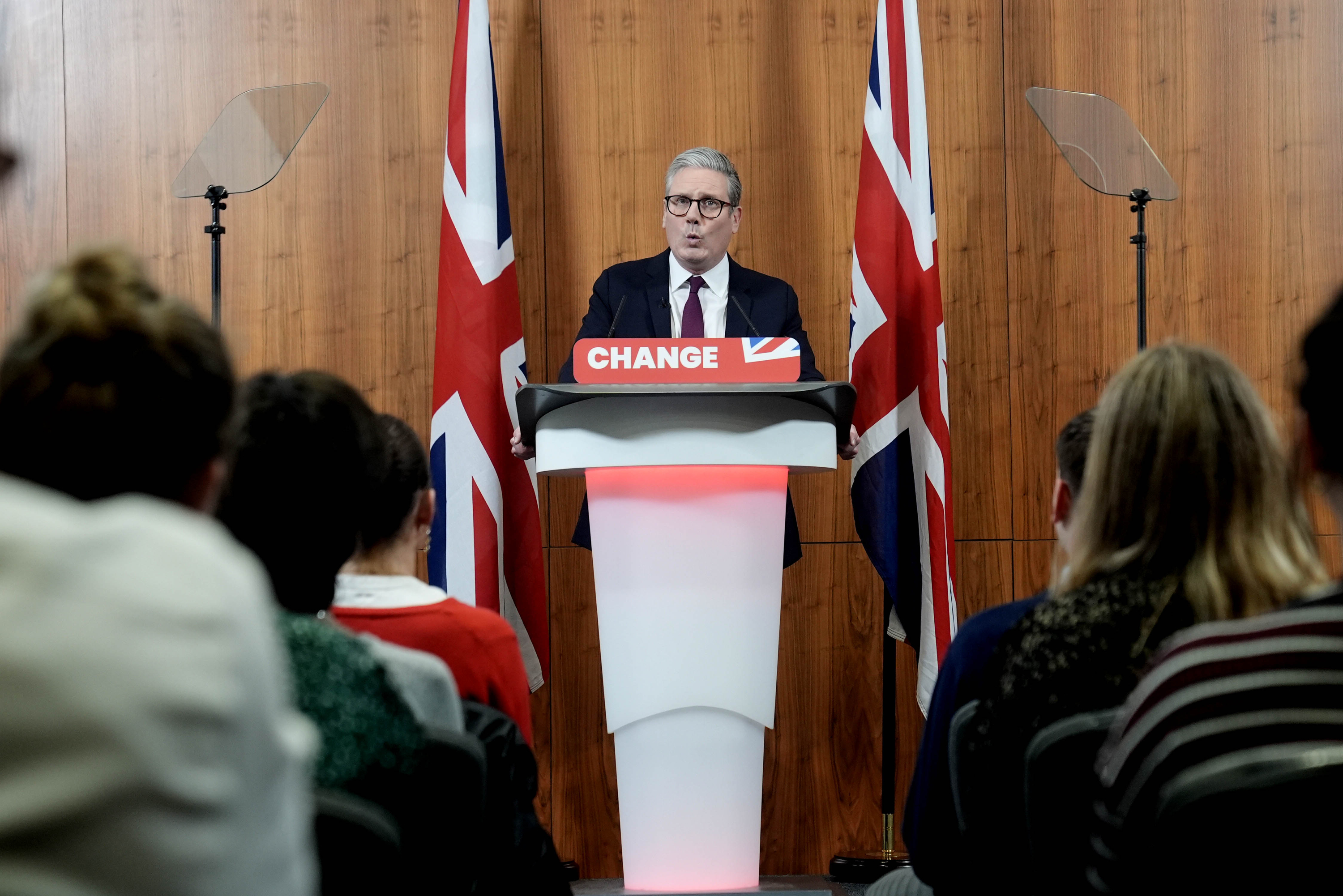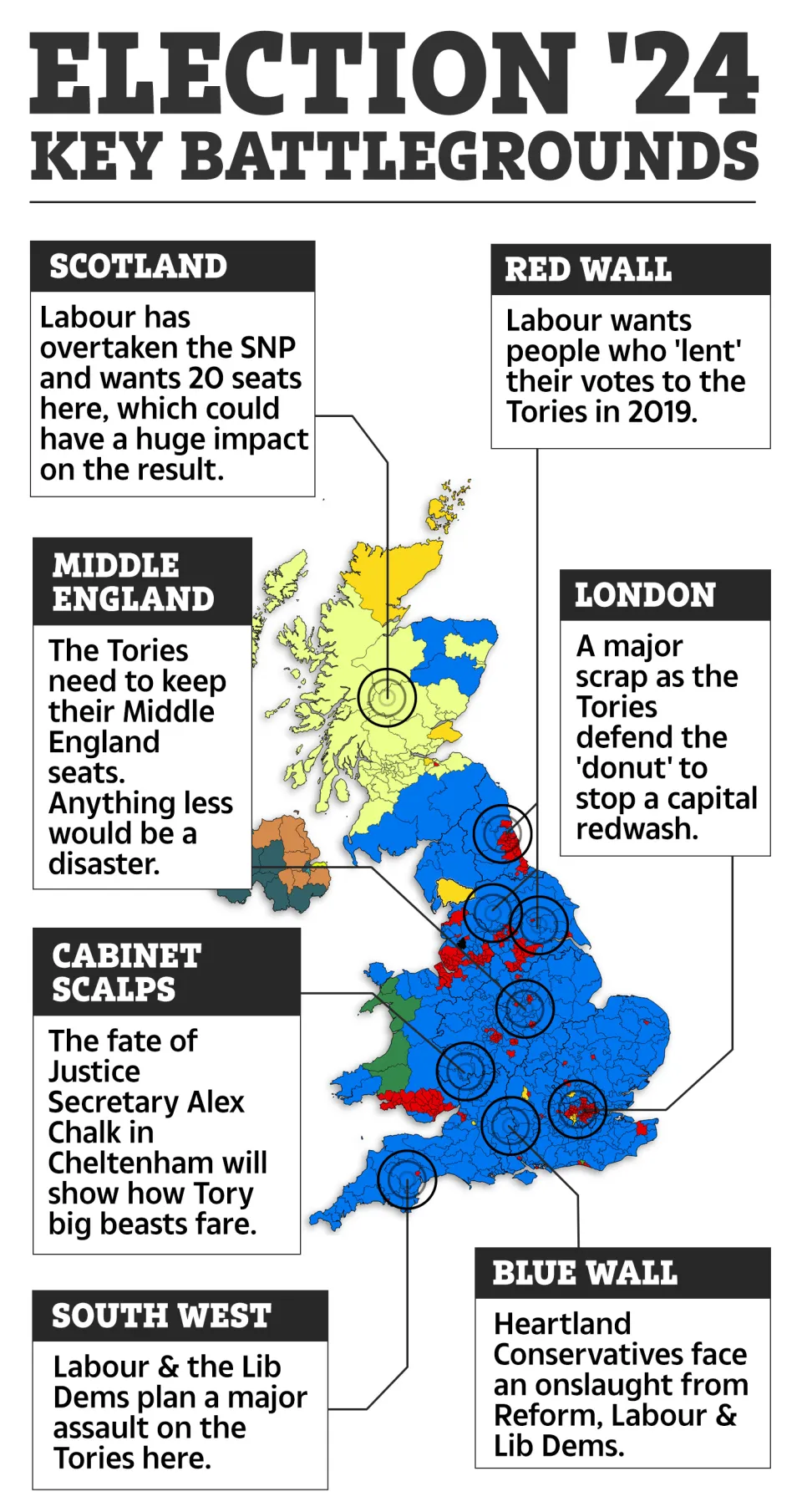Six weeks of vote-battling commences this morning as the PM embarks on a media blitz before a series of whistle-stop visits.
All party leaders are expected to be out in public following yesterday’s dramatic announcement of a July 4 poll.
Rain-drenched Mr Sunak blindsided the country – including most of his own Cabinet – by gambling on an early election rather than waiting until the autumn.
He kicked off the contest last night at a campaign rally where he told Tory supporters: “Let’s get out and do this.”
He added: “Now is the moment for Britain to choose its future and decide whether we want to build on the progress that we have made or risk going back to square one with no plan and no certainty.”
At his own event, Sir Keir said: “If they get another five years they will feel entitled to carry on exactly as they are. Nothing will change.
“A vote for Labour is a vote for stability, economic and political, a politics that treads more lightly on all our lives. A vote to stop the chaos.”
Reform party leader Richard Tice is expected to hold a press conference today, with all eyes on whether Nigel Farage throws his weight behind its campaign.
Lib Dem leader Sir Ed Davey is also set to begin his targeting of the “Blue Wall” areas of once traditionally Tory southern seats.
The economy and immigration are set to dominate the campaign, as well as whether voters want to stick to what they know or if there is an appetite for change.
The 7 key issues that will decide the General Election
By JACK ELSOM, Chief Political Correspondent
Economy
BOTH Tories and Labour will want to stake a claim as the party of economic stability and prosperity.
Previous elections show that voters tend to reward the incumbent government if they feel better off – and punish them if they do not.
Sunak – an unashamed numbers bod – is most comfortable when defending his economic record and has a flurry of recent victories to sell.
Inflation has been sharply reduced to within touching distance of the 2 per cent target, Britain has exited recession, and the IMF has projected strong growth.
Labour will aim to trash that record and point to Liz Truss’ chaotic mini-Budget.
Stability or change?
DO voters want to stick with what they know, or is there an appetite for change?
That question cuts to the heart of the election, with both leaders sensing mileage in the other.
After being dealt a bad hand, Sunak has insisted he has turned things around and put the country on course for a “brighter future”.
He says Starmer would “take us back to square one.”
For his part, Starmer insists that “stability is change” and a switching of the guard is desperately needed.
Immigration
SUMMER is the high season for Channel crossings and the sight of small boat arrivals will likely raise the salience of illegal migration as an electoral issue.
Mr Sunak believes voters back his Rwanda plan and will draw a clear dividing line with Labour for vowing to axe it altogether.
Questions now hang over whether the PM can fast-track the first plane to take off before Polling Day as the civil service grinds to a halt.
The numbers are currently not in Sunak’s favour, with illegal migration running at a higher rate than any year on record.
And legal migration is still stubbornly high and miles off Boris Johnson’s 2019 pledge of 250,000.
Crime
IN recent months both Sunak and Starmer have made big pitches as being tough on law and order.
Realising voters are fed up with crime going unanswered and unsolved, expect them to talk in the strongest terms about cracking down on theft, shoplifting and antisocial behaviour.
Crime has traditionally been comfortable Tory territory and Sunak will likely make pledges about giving police more powers to blitz yobs.
But Starmer has spied an opportunity to park Labour tanks on his lawn and has been hamming up his previous career as a top prosecutor.
NHS
CUTTING NHS waiting lists is the single pledge Sunak has openly admitted he is failing to hit.
He has blamed the lack of progress on endless strikes, but now rarely talks about it as an issue compared to the economy and immigration.
Labour on the other hand see it as home turf and will be hammering the government’s handling of the health service.
Polls consistently put the NHS as one of the public’s top priorities and Starmer will look to weaponise the groaning backlog.
But he will be forced to defend the Welsh Labour administration’s record which is arguably worse than the Tories’.
War
THE world is becoming more dangerous and the public is looking at Sunak and Starmer to keep them safe.
Sunak will point to his recent pledge to ramp up defence spending to 2.5 per cent of GDP by 2030 – and seize on Starmer’s refusal to match that.
Labour has outlined an “ambition” to hit that target but is yet to spell out a pathway to fund it, accusing ministers of cooking the books.
And expect Tory MPs to dredge up Starmer’s years-long support for Jeremy Corbyn.
A knock-on effect of global unrest is the domestic reaction to the war in Gaza, which has the possibility to seriously hurt Labour.
Many of the party’s once-solid Muslim support base are furious with Starmer’s support for Israel.
Net Zero
SUNAK has promised voters will not pay in the pocket for the drive towards Net Zero, delaying green targets to ease the financial burden on families.
Whereas Labour are promising an eco revolution backed by billions of pounds of spending and Ed Miliband leading the charge.
Expect the Tories to warn of tax rises to pay for this as well as further climate clampdowns like Sadiq Khan’s hated Ulez expansion in London.
With Reform wanting to ditch Net Zero altogether, Sunak will likely try to blunt their attacks by vowing Brits will never suffer as a result.
Campaigning will be in full swing as the nation starts watching Harry Kane‘s Three Lions and enjoys major summer events such as Taylor Swift‘s tour and Wimbledon.
The Prime Minister leapt on news of tumbling inflation to take a massive gamble on his chances of staying in No10.
Standing in a Downing Street downpour at 5pm, the drenched Prime Minister declared it was time to choose between him and the man he says has no plan — Labour leader Sir Keir Starmer.
At times Mr Sunak was drowned out by protesters blasting Labour’s 1997 election anthem — D:Ream’s Things Can Only Get Better — from a nearby street.
But, staying poised, the PM revealed he had met King Charles at Buckingham Palace earlier in the day to request that Parliament be dissolved ahead of Polling Day.
After months of suggesting an autumn ballot, he sprang the early vote on his Cabinet and stunned backbenchers — puzzled at the risk to go early when the Tories trail by 20 points in the polls.
The early vote also means it is extremely unlikely a single plane will take off for Rwanda by polling day, despite the flagship deportation scheme being front and centre of the PM’s offering.
Mr Sunak insisted however that he was “proud of our achievements” as he kick-started eight weeks of campaigning that will clash heavily with football’s Euros.
Referencing the Covid pandemic, introduction of the furlough scheme for workers and the Ukraine war, Mr Sunak said: “The last five years have been the most challenging times since the Second World War.
“Now I cannot and will not claim that we have got everything right. No government should.
“But I am proud of what we have achieved together, the bold actions we have taken and I’m confident about what we can do in the future.
“Now is the moment to choose to decide whether we want to build on the progress we have made, or risk going back to square one with no plan and no certainty.
“Because of our collective sacrifice and your hard work, we have reached two major milestones in delivering that stability, showing that when we work together, anything is possible.
“Our economy is now growing faster than anyone predicted, outpacing Germany, France and the United States — and this morning it was confirmed that inflation is back to normal.
“This means that the pressure on prices will ease and mortgage rates will come down.
“This is proof that the plan and priorities I set out are working.”
Parliament will sit until Friday to crash through some remaining Bills into law, likely including the smoking ban.
Once Parliament is dissolved, all MPs will automatically vacate their seats and the Civil Service will enter a period of effective pause known as “purdah”.
The parties will also launch their manifestos setting out their core promises.
Election TV debates will likely take place in the days leading up to Polling Day.
TREVOR KAVANAGH: Brits who must now choose who to vote for might finally begin to scrutinise Starmer and his promises
By TREVOR KAVANAGH
BARELY a week ago, Rishi Sunak assured Sun columnist Jane Moore and her fellow Loose Women we were safe to book our summer holidays.
Hapless Tory MP Matt Warman was yesterday cleared by Downing Street to dismiss rumours of an early election.
Hours later, a rain-sodden PM startled the nation — including his own Cabinet and Tory MPs — by asking the King for a snap general election on July 4.
The only upside about going so early is that the downside of hanging on is so bleak.
How will that go down with millions of footie-mad punters as wall-to-wall Euros coverage is interrupted by political hustlers ringing their doorbells?
Sure, inflation — 11.1 per cent in October 2022 — plunged this week to 2.3 per cent, the lowest for three years, with more falls to come.
Interest rates and mortgage costs will follow suit.
UK growth is outpacing our European rivals.
But we will not see planeloads of illegal migrants flying to Rwanda.
Indeed boatloads are setting new records.
Keir Starmer’s Labour Party is an average 21 points ahead in the polls.
Reform has grabbed Tory votes.
The Greens and SNP will refuse to do business with Rishi, even if he scores a hung parliament.
There is one slender hope.
Voters who must now choose where to place their X on the ballot paper in challenging times might finally begin to scrutinise Starmer and his promises.
If so, some who have vowed never to vote Tory again might feel queasy about putting Labour in power.
Labour stalwarts admit there is no love for Starmer or his party, no manifesto and no plan for the economy.
Labour will be soft on immigration, ditching the Rwanda plan just as it takes off and dishing out visas to tens of thousands of illegals already here.
These are the battlefields for wavering votes over the next six weeks.
Polling guru Sir John Curtice last night hailed Rishi’s snap poll as “either very brave or very foolhardy”.
“We will discover in the early hours of July 5 which is correct,” he said.



